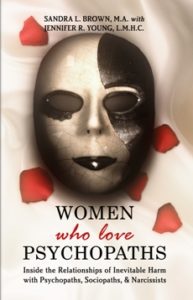Women Who Love Psychopaths – 3rd Edition – e-Book
Now Available!
By field-pioneer and survivor therapy innovator, Sandra L. Brown, M.A. with Jennifer R. Young, The Institute’s Director of Survivor Services (counseling).
The Institute for Relational Harm Reduction & Public Pathology Education is the field-leader and innovator in PLR survivor treatment, research and education. The Institute has created the only recognized Model of Care Treatment approach for PLR survivors following Trauma-Informed Care practices and evidence-based treatment approaches. Sandra is the President of the Association for NPD/Psychopathy Survivor Treatment, Research & Education. www.survivortreatment.com
New in the 3rd edition of Women Who Love Psychopaths:
MORE information than the previous edition of the book! Since the release of the 2nd Edition nine years ago, we have been hard at work in the areas of survivor recovery techniques, therapist treatment training, and research—what traits in survivors are targeted.
- All of our most recent updates on new knowledge of trauma-specific injuries like cognitive dissonance
- New updates on Super Traits taken from our research with Purdue University
- Our latest findings on why therapists are missing trauma in survivors because of the ‘atypical’ presentation of PTSD
- What to look for when finding competent care
- The basics of what every recovery should include
- And so much more…
This book, complete with survivor worksheets and information for assessing partner possible disorders, can help –
Survivors
- Understand your own personality profile (identified as ‘targeted’ by these disordered personalities), taken from our 30 years of treating the survivors and the only research ever done on narcissist and psychopath’s victims, so that you can take pro-active steps to guard these ‘super traits’ (that are most targeted) by preventing another painful relationship
- Make sense of the crazy-making relationship dynamics, ‘why they do that,’ how they differ from other dysfunctional relationships, why you didn’t see them coming, and how to spot them in the future
- Learn what disordered personalities can never do in relationships, how their disorders were created and the neuroscience of their brain (which prevents lasting change), use our worksheets to see which disorders they are likely to have, what you can expect from their functionality, and why you were so harmed
- Understand the #1 symptom in all Pathological Love Relationship (PLR) survivors—cognitive dissonance, how it’s created, what survivors are likely doing that is INCREASING traumatic symptoms, and the layers of cognitive dissonance which each need focused recovery treatment or self-help
- Wonder why a therapist has missed your trauma symptoms? Understand the undiscussed reality of the unique type of PLR PTSD that has atypical symptoms that therapists don’t recognize. Recognize how cognitive dissonance is making your PLR PTSD worse and what needs to happen
- Assess your own traumatic symptoms, fix why your recovery has stalled, use our guides to find competent care and learn what to avoid, understand why your therapist might be missing important clues to your needed treatment, and learn what your therapist needs to know
- Think you are codependent or an empath? Learn why these are likely untrue, why you won’t get well getting treatment for these, and what you need to focus on
- Have you been told you just need to ‘trust your gut’ to avoid a PLR in the future! Learn why this is not true for PLR PTSD survivors and why doing exactly that is likely to end up in another PLR! Learn why you have inconsistent intuition and what trauma has done to your intuition system
- Want to institute self-help measures? Get our Recovery Basics that can get you on the path to recovery even before you find a therapist
Family and Friends
- What you should know about what the survivor has been through and why she isn’t getting over it quickly
- The depth and breadth of her traumatic injuries and what she needs in order to recover
Therapists of the Survivors
- Stop wrong diagnosis, understand hidden atypical PTSD symptoms, identify the risk factors inherent in her personality trait elevations, work with the #1 often hidden symptom in this genre-specific population
General Public
- Learn the signs and symptoms of life and soul-destroying disorders—the impact to the partner, children, and societal systems—before you end up in one of these relationships of ‘inevitable harm,’ and why everyone should be concerned.
Price: $11.00
Available in EPUB format, which works with most e-readers, and PDF, which can be downloaded to your computer and read without the need for an e-reader.













